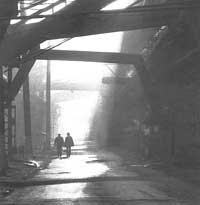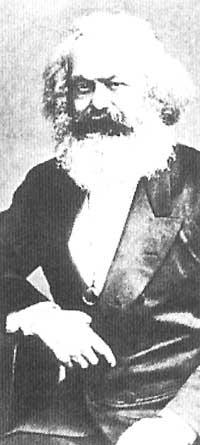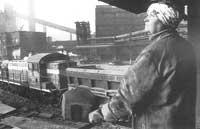Pre-Marx Socialism: Utopian

As we know, that industrial revolution is the XVIII. In the 20th century it began in England and it took France more years to learn about this transformation. Therefore, while Saint Simon, Fourier or Proudhon were developing the essence of their work, the results of violent industrialization were not known in France. On the other hand, in English socialism, especially in Owen's, the knowledge of industrial reality will be much greater.
When analyzing the works of the aforementioned thinkers, we will use the name of utopian socialism invented by Marx.
In Marx's view, these thinkers did not clearly understand the process of industrial development and this is because their works were written before the class struggle between the bourgeoisie and the proletariat became a common phenomenon.
Charles Fourier (1772-1835)
His work is full of strange theories and strange dreams and his influence has been very great. His theory is based on three main axes:
- General expression of the universe and XIX. In the 20th century it was boiling.
- In a deep critique of the capitalist system.
- On the occasion of the industrial and commercial revolution, both in the proletariat and in the petty bourgeoisie or among the artisans were not fully defined, in a plan of voluntary solidarity.
The book Theorie des quatre mouvement et des destine'es generates is Fourier's main book in Ian. In it he explains the foundations of the society he dreamed of and will tell us: "In the industrial system everything is vicious, the world is crab." Fourier does not believe that the industry can make any progress, he said that "manufacturing advances as workers become impoverished."

Fourier will propose a new and voluntary social structuring, called falansterio. According to this theory, work is not considered necessary if it is something to be done with will, will and tendency. Each falansterio would occupy some 1,600 people, lead a community life and the economic base would be agriculture. He believes that this way of life would generate new unthinkable twists until then. However, the falansterio system is not a communist system: Fourier considered inheritance, wealth and poverty normal.
Fourier does not take the state into account when structuring its falansterios and said the state would develop through the "voluntary agreement" between falansterios. In addition, the restructuring of society favors going from bottom to top and not from top to bottom, Saint-Simon postulated the latter. The State would therefore be a federation of free associations.
Some of the ideas we met thanks to Fourier's work have a great use today; in their day they were innovative ideas. He considered that with an appropriate community model social reform would be achieved and no political change or abrupt revolution would be necessary.
Robert Owen
He was born in the Newtown of Wales and when he was not very educated he started working at age ten. He studied on his own and at nineteen he began to work as an administrator of a cotton factory of 500 workers in Manchester. There they made some improvements and became partners. Many of the practices that today can be considered scandalous at Owen's time were absolutely normal, such as children between five and six years old, like Ian, living in misery and alcoholism.
Concerned about all this, Owen launched a new project: he built the right housing, opened the cheap shops, launched a behavioural promotion system at the factory and was primarily concerned with education. Thus, the village where its factory was located, called New Lanark, became a singular and atypical community, in which the only hierarchy that existed was that of age, reserving the positions of responsibility to older people. On the other hand, it launched the educational model XX. In the twentieth century it was what is known as active education.
In 1813 his new vision of the Society. He edited a paper entitled Essays on the formation of the human condition. It tells us that social transformation is in the hands of people and that responsibility is in those who have the rule of peoples. The environment conditions the human being and claims the need for an enabling environment for childhood education to be adequate.
Based on his theories, he launched a campaign for industrial reform, which prevented children up to ten years of age from doing in Ian, so that those up to eighteen years of age would do less than ten and a half hours a day, and make a great effort to reject night work. He came to draft a bill, but his bill did not move forward. They began to consider the idealist as subversive, considering that he was a supporter of religion, marriage, family and expropriation, they snatched his support. In any case, his intentions were not limited to those simple characteristics: in his opinion, throughout the century a new spirit and a new will had to be created, so that human beings would be rational and consistent, for which it was necessary to use the science of human nature.
D. Pierre Proudhon (1809- 1865)
Born in Besanon in a family of craftsmen. At age 17, the family had to get to work in a printing press. This allowed him to read a thousand things and, by himself, he studied Latin, Greek and Hebrew. His early works, especially those known as the General Grammar Essay, were very successful, but what is Jabegoa? When he published the name, the first ones who helped him were opposed because in Ian it was said that the property was a theft. However, his name was well known, both in France and abroad. He continued against the established order and had to serve three years in prison.
Proudhon Fourier, Saint-Simon and the other utopians opposed rising up and restructuring society because they believed the transmission of authority was useless. These theories can be found in the Ian framework, called System of Economic Contradictions or Fiosophie of Misery. Marx responded to Ian a year later with the work Misery of Philosophy. This will bring about a rupture between Marx and Proudhon, which can be seen as the origin of inequality between anarchists and communists.

The importance of Proudhon's work does not lie in his crude prayers: "property is theft", "the richest and poorest class" or "the heart of the proletariat is like the richest, the drain of great rationality and the leaven of dirt and hypocrisy", among others, even if these or similar are used by all revolutionaries. The importance of his contribution lies in his perception of social and human nature. In his opinion, what makes us human is a job and what he has not done in Ian cannot be considered a human being, so he does not make a morally healthy life. Therefore, daily work is not only a social necessity, but a moral virtue, which brings together the basic element of social and economic life and the ethical model.
His theory of society can be summarized in two sentences:
"The government of man through other human beings, with any name, is just an oppression" and "our idea of anarchism is twofold: not the government after refusing property."
Karl Marx
This well-known philosopher and economist was born in Germany. After studying there and writing a lot, he had to emigrate to Paris and Brussels. They contacted Engels and together they wrote the Communist Manifesto in 1848. The following year he was expelled from Brussels and settled in London, where he wrote the Capital and founded the "International Workers' Solidarity" or "Previous International".
Marx is the real theoretical "liquidator" of capitalist civilization and, somehow, successor of the spirit of the Enlightenment. This heritage was in decay: when the success of the bourgeoisie did not become skeptical humanism it became nihilism. Marxism has a great importance in sociology and today no one denies it. However, the political and economic consequences of Marx's theories have meant that sociologists, often fascinated by empiricism, have not taken into account the influence of Marxism in sociology.
However, today Marx is taken as the "founding father" of sociology, such as Saint-Simon or Comte. As Lefebvre says, "Marx is not a sociologist, but in Marxism there is a lot of sociology." Marxism itself cannot be framed in a singular science, not only economic, but also philosophical and sociological, but an overview, although in itself we find sociology.
When reading Marx's works, for the first time we find the difficulty of the language, since in his style we find the influence of German, French and English. On the other hand, this difficulty seems to be something sought with knowledge. In Marx's works, alongside criteria of value, there is a scientific analysis and a high degree of utopia.
As Maximilien Rubel wrote in his work Karl Marx: "Sociological expression and ethical reflection go hand in hand and generate an operational theory of the causes, conditions and objectives of the modern social revolution. However, the causes and conditions of this revolution are not always clearly differentiated, and Marx intentionally confused them from the beginning. It plays a double role: sociologist and revolutionary, spectator and actor."






